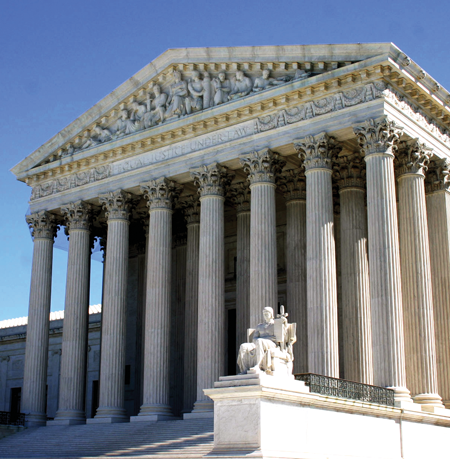Court rules on birth certificate designations for same-sex parents

Flickr Creative Commons
On the busy final day of its term in late June, the U.S. Supreme Court issued an unsigned decision that pleased advocates of same-sex marriage. At the same time, it arguably revealed at least one new legal foe of such marriages and sparked debate about whether the court’s 2015 decision that legalized them was now cemented as a matter of precedent.
In Pavan v. Smith, the court issued a per curiam decision, over the published dissent of three justices, that requires the state of Arkansas to treat the issuance of birth certificates for the children of same-sex married couples exactly as it does for opposite-sex married couples.
“It was an incredibly important decision,” says Courtney G. Joslin, a professor and family law expert at the University of California at Davis School of Law. “The court emphatically declared that the rules about children must be applied equally to same-sex spouses.”
Biology and Marriage
The decision came in the case of two lesbian couples—Leigh and Jana Jacobs, who married in Iowa in 2010, and Terrah and Marisa Pavan, who married in New Hampshire in 2011.
One member of each couple (Leigh Jacobs and Terrah Pavan) gave birth to a child in 2015 by artificial insemination. Each couple sought to put both spouses’ names on their child’s birth certificates. But the Arkansas Department of Health issued certificates that listed only the birth mothers’ names. A state statute specifies that “the mother is deemed to be the woman who gives birth to the child.” If the mother is married at the time of birth, the law says the name of her “husband shall be entered on the certificate as the father of the child.”
The state’s rule that requires the listing of the woman’s husband as a parent has some limited exceptions. But it generally applies even in cases of artificial insemination.
The two couples sued, alleging that the state requirements were inconsistent with the Supreme Court’s 2015 decision in Obergefell v. Hodges, which held that a state may not “exclude same-sex couples from civil marriage on the same terms and conditions as opposite-sex couples.”
A state trial court agreed with the couples. But the Arkansas Supreme Court reversed and upheld the state statute, saying that it “centers on the relationship of the biological mother and the biological father to the child, not on the marital relationship of husband and wife.”
The couples did not even ask for summary reversal when they sought Supreme Court review of their case—only that the justices take up their case. Arkansas officials defended the state high court’s ruling, saying in a brief that “courts across the country have also long recognized that parental rights flow from biology, not marriage.”
The justices considered the case at six private conferences before they issued the per curiam decision on June 26. “The Arkansas Supreme Court’s decision, we conclude, denied married same-sex couples access to the ‘constellation of benefits’ ” that the state has linked to marriage, the unsigned opinion says, quoting language from Obergefell.
“Same-sex parents in Arkansas lack the same right as opposite-sex parents to be listed on a child’s birth certificate, a document often used for important transactions like making medical decisions for a child or enrolling a child in school,” the per curiam opinion said.
“We think it is significant this was a summary reversal,” says Catherine Sakimura, family law director at the San Francisco-based National Center for Lesbian Rights, which helped represent the two couples. “The court decided that this result was so clearly required by Obergefell.”
However, one conservative legal observer says the Pavan decision was a case of the Supreme Court majority exceeding the court’s authority.
“Obergefell only held that states must license same-sex marriages and recognize licenses issued by other states—nothing else,” says Travis Weber, director of the Family Research Council’s Center for Religious Liberty in Washington, D.C. “States still regulate marriage more broadly, and the state of Arkansas has the authority under the Constitution to answer questions which the Supreme Court left unanswered—questions like those which arose in Pavan.”
Gorsuch Dissent Revealing
Justice Neil M. Gorsuch filed a dissent to the per curiam that Justices Clarence Thomas and Samuel A. Alito Jr. joined.
Gorsuch objected to the majority’s handling of the case without setting it for oral argument, saying that the question and some of the peculiarities of the Arkansas couples’ case did not seem to warrant “the strong medicine of summary reversal.”
Nothing in the court’s Obergefell decision spoke, “let alone clearly,” Gorsuch said, to a state’s rules meant to ensure that a child’s biological parents are listed on the birth certificate.
The state had advanced rational reasons for its biology-based rules, “like ensuring government officials can identify public health trends and helping individuals determine their biological lineage, citizenship or susceptibility to genetic disorders,” he added.
Sakimura calls Gorsuch’s dissent “baffling” and “legally and factually inaccurate.” She read the views expressed by the newest justice, who, of course, was not on the high court for the landmark 2015 decision on same-sex marriage, as “expressing his disapproval for Obergefell and marriage equality, and making it known that same-sex couples are not entitled to marriage rights.”
Melissa Murray, a professor and family law expert at the University of California at Berkeley School of Law, agreed that the Gorsuch dissent was “quite revealing.”
Considering Gorsuch’s active pen in his first three months on the court in writing dissents and concurrences, Murray says, “we have this new justice who is really flexing his muscles on the court.”



